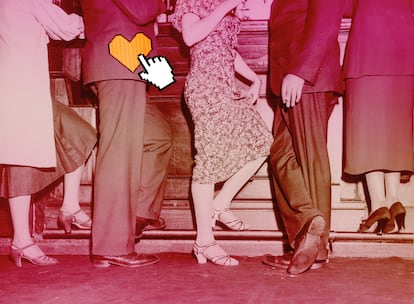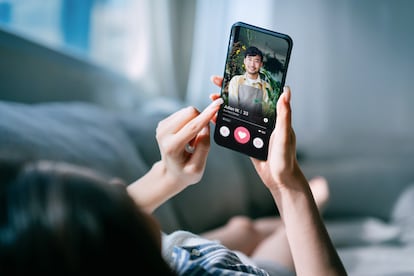“Dating can be like a real-life ‘Squid Game’ minus the killing part”: Have flirting apps desensitized us?
Trends such as ghosting and gamification have led to growing disenchantment with these types of applications

When Tinder was born in September 2012, the dating universe — and with it, our vocabulary — inevitably changed. In addition to doing away with the stigma around finding a partner online, without Tinder the term “ghosting” might not exist, and the verb “to swipe” would convey a completely different meaning. By its 10th anniversary, Tinder had been downloaded 530 million times and was responsible for more than 75 billion matches. Some, however, argue that the dating app boom has killed romance and made us act like robots when it comes to finding a partner.
Model Charli Howard recently published an article on Stylist magazine in which she described the dating process as “unbearable,” arguing that some forms of communication as hypersexual. “For me, modern-day dating can only be described as a real-life Squid Game (minus the killing part, although heartbreak can often feel as painful). There’s the initial battle to see who can outlast the talking stage, trying to maintain the person’s interest before even reaching a first date; emotionally preparing yourself to be ghosted at any time; and then – if you’re lucky enough to even get that far – figuring out when to have the anxiety-inducing ‘What are we?’ chat… because, apparently, two people liking each other isn’t enough anymore,” she writes.
Guillermo Fouce, doctor in social psychology and professor at the Complutense University of Madrid, agrees: “Nowadays, emotional, loving and sexual relationships are being transformed. We have many likes, opportunities and interactions, but they are all superficial and none of them hook us in. That’s why we live in a world of loneliness. [...] These liquid relationships also combine with the era of individualism, in which one is at the center of everything. There are new ways to flirt, apps made specifically for connecting people, and others that were not created with that in mind, but that are also used for that, from Instagram to BeReal. The apparent possibilities for connection are so enormous that we move on to the next one as soon as we can. We don’t reply, we disregard what we don’t like the look of. Many flirt from this perspective. In the end, one of the things that make up the theories of love in social psychology is that the main variable that explains why a relationship can be established is the possibility; the closeness. Social networks make that easier.”

According to Tinder’s “Future of Dating Report 2023,” 32% of members of Gen Z are less likely to ghost someone than users over 33. What it does not say is how many people do ghost. Meanwhile, Bumble does share that information with EL PAÍS: 42% of those surveyed by the platform have been ghosted at some point, while 22% admit to having done so. “Even so, more than 73% think that this is not an appropriate way to end a relationship, which reflects the fact that people seek emotional responsibility in their relationships, even when they don’t prosper,” explains Ana Lombardía, psychologist and sexologist on Bumble.
While in real life it would be strange to walk out on a date in the middle of a conversation, suddenly stopping talking to someone, even if you’ve already started a relationship, it has become a painfully common practice. Journalist and writer Alison P. Davis writes in New York Magazine: “It’s easy to overestimate the way technology shapes us and to discount the way technology bends to our needs and wills and desires. It’s possible Tinder didn’t do anything but promise us connection and we’re the ones who decided how we wanted to connect.”
Núria Jorba, psychologist, sexologist and couples therapist, explains that “emotional management is not easy; it entails facing conflict and fear of the other’s reaction, as well as good assertiveness to express what one feels and thinks, even if it’s not positive. It is much easier to just disappear. This is why ghosting has become a trend, even more so when it’s done from behind a screen, which favors anonymity. The problem is that it is very easy, but when you’re on the receiving end it is very unpleasant and causes much discomfort and uncertainty.”
The format of swiping photos gamifies the apps, with the resulting problem of ending up treating human beings as if they were video game characters that we don’t think twice about turning off; just like blocking that person that we have been talking to for a long time does not worry us either. “The important thing is to be aware of what we don’t want others to do to us, so that we don’t do it ourselves. You have to use dating apps responsibly, to think that behind each photo there is a person. And if you don’t like something, express it assertively and end things without disappearing. If you act responsibly, you end up receiving the same. And if we feel that this is not the case, perhaps we should find another way, because an app is not the only way to find a partner,” says Jorba.
Meanwhile, Fouce wonders if the greater availability offered by apps could lead us to refuse to commit to just one partner, or embrace more open relationship models. “One has to distinguish between attraction, first contact and sexual impulse. [American psychologist] Robert Sternberg says that there is a love triangle that defines relationships. It is made up of the sexual impulse, which is also what makes us connect in the first place; intimacy, the ability to talk and establish relationships with the other; and finally, the relationship itself and the ability to establish it. We have to understand that in the apps we share our happy moments; there is a hypertrophy of happiness. But in truth, that is like going out to socialize and trying to project our best image. Then, it is intuition and the ability to establish intimacy that can prevent us from coming across unpleasant surprises when we look for a partner. Apps are useful for establishing contacts, just like places of leisure, and from there we can assess. But a partner is something that goes beyond that.”
Too many options?
Choice paralysis comes into play when there is a vast number of options. “Some people make the mistake of believing that, because there are so many people in the app, they should wait for a better person to appear, or for one that will be enough for everything to work out effortlessly. This is an illusion. Although we may like one person more than another, or we can be more compatible with some, what’s important is what you do about it, the bond which you develop, the experiences that unite us,” states Lombardía.

Therapist Noemí Seva Vidal believes that, when someone knows for certain that they want a stable relationship, they will not change their mind because they have more options. However, she also believes that a certain emotional FOMO can arise. “There could be the feeling that there might be another that I could meet, and I’m not. So in a more initial phase we can be talking to several people at the same time, assessing which one we go a step further with,” she reflects. “People have to know themselves and know what is good for them and what is not. We have to be consistent with this and not play games that don’t go with our personality or the way we function. Not having sex on a first date if I know that it won’t make me feel good afterwards, not having five dates in one week if I feel that my body is asking for some rest, not just talking to people on apps for no reason if every time I go in I notice that it lowers my energy and affects my self-esteem. It’s about listening to ourselves and also about being able to see why we do what we do and establish some self-care limits to protect ourselves.”
Lombardía emphasizes the importance of learning to use technologies responsibly, having a clear goal and setting limits. “We must be aware of their operating mechanisms, of what they provide us, of the reasons why we are using them. It can help us to use them with affective responsibility, without taking them as a game, and focusing on meeting someone with whom we can build a bond.” The important thing is to remember that it is not the app that is doing the ghosting; it is the user. Blaming dating apps for the misuse that some people make of them is like blaming Uber Eats for your hamburger having too much lettuce. If only emotional responsibility was that easy to control.
Sign up for our weekly newsletter to get more English-language news coverage from EL PAÍS USA Edition
Tu suscripción se está usando en otro dispositivo
¿Quieres añadir otro usuario a tu suscripción?
Si continúas leyendo en este dispositivo, no se podrá leer en el otro.
FlechaTu suscripción se está usando en otro dispositivo y solo puedes acceder a EL PAÍS desde un dispositivo a la vez.
Si quieres compartir tu cuenta, cambia tu suscripción a la modalidad Premium, así podrás añadir otro usuario. Cada uno accederá con su propia cuenta de email, lo que os permitirá personalizar vuestra experiencia en EL PAÍS.
¿Tienes una suscripción de empresa? Accede aquí para contratar más cuentas.
En el caso de no saber quién está usando tu cuenta, te recomendamos cambiar tu contraseña aquí.
Si decides continuar compartiendo tu cuenta, este mensaje se mostrará en tu dispositivo y en el de la otra persona que está usando tu cuenta de forma indefinida, afectando a tu experiencia de lectura. Puedes consultar aquí los términos y condiciones de la suscripción digital.









































